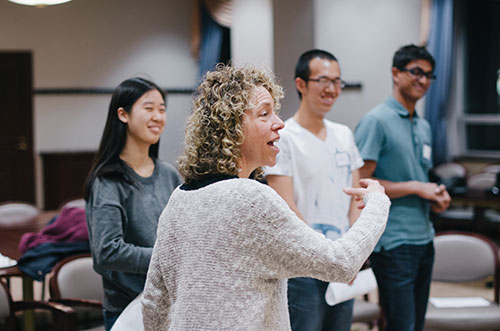Julie Diamond works with Gamers through a conflict resolution exercise on January 14, 2015 (Photo: Alan Wu).
As with any other team, conflict is one of the biggest challenges that The Gamers are facing, despite the fact that we were given the chance to build our own team with people who share the same values. So, what is the best way to approach team conflict and issues? An amazing facilitator, Julie Diamond, came to our rescue by showing us a new way to approach conflict resolution.
She started by saying that difference is critical among team members. She definitely got my attention with that statement! She explained that productive conflict is essential to effective teamwork as it provides an opportunity to negotiate differences and come up with the best possible outcome or solution.
One of the most fascinating parts of the workshop was when Julie talked about the Four Tyrannies that hold a team back. The first is Similarity: teams with members who are too alike often miss looking at a problem from different perspectives. And, when you are solving a problem involving building a better world, there are many different angles that need to be considered.
The second tyranny is Harmony, which is the tendency of teams to avoid conflict, thus, missing the chance to elaborate with one another and brainstorm great ideas. Now, if you haven’t been shocked surprised by the tyrannies so far, you will when you read about the third one!
The third is Democracy. We have always been told that democracy is a good thing, but when it comes to a team setting, it is sometimes beneficial for people to speak up and disagree to allow for further exploration of options. This point probably was the one that stunned me the most.
The fourth and final tyranny is Intelligence and Expertise. People who are experts in a field tend to have a narrower point of view than non-experts, mostly because their ego and expertise gets in the way of considering novel ideas.
For the workshop portion of the evening, Julie walked us through the three sides of a conflict. Imagine a conflict to be a triangle consisting of “My Side,” “Your Side,” and “Outside.” She explained that people rotate through different positions continuously throughout an argument. We were then asked which side we think is the hardest to take. Julie explained how staying on “My Side” is the hardest task during a conflict resolution exercise because people tend to constantly rebut their opponent instead of staying true to their values and their own side.
We were then asked to form a triangle, each person taking a side and start the conflict exercise among ourselves. People started discussing The Game, sharing ideas, working through their team conflicts, and trying to find solutions. People kept moving from one side to another, trying to find their true side. It was through this exercise that we all began to realize our role in our teams. With much deeper insight about the role I play on my team, I can’t wait for us to get back together and continue our great discussions!
-Deniz Jafari (Gamer, EngSci 1T5+PEY)
For another perspective on the Julie Diamond workshop on team consciousness and productive conflict, check out Tianyuan Amy Li’s summary of the session.

